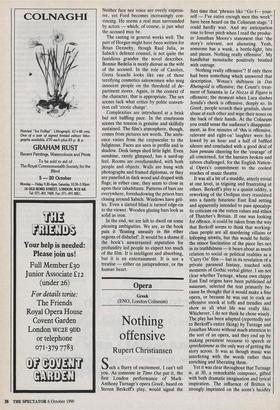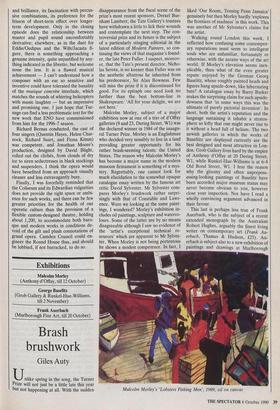Opera
Greek
(ENO, London Coliseum)
Nothing offensive
Rupert Christiansen
Such a flurry of excitement, I can't tell you. As someone in Time Out put it, the first London performance of Mark- Anthony Turnage's opera Greek, based on Steven Berkoff's play, would signal the
first time that 'phrases like "Go f— your- self — I've eaten enough men this week" have been heard on the Coliseum stage.' I could hardly wait. And my anticipation rose to fever pitch when I read the produc- er Jonathan Moore's statement that 'the story's relevant, not alienating. Yeah, someone has a wank, a bottle-fight, bits and pieces. Nothing really offensive'. My handlebar moustache positively bristled with outrage.
'Nothing really offensive'? If only there had been something which answered that description. Wotan's shiftiness in Das Rheingold is offensive; the Count's treat- ment of Susanna in Le Nozze di Figaro is offensive; the moment when Laca slashes Jenufa's cheek is offensive, deeply so. In Greek, people scratch their genitals, shout abuse at each other and wipe their noses on the back of their hands. At the Coliseum you could sense the audience's disappoint- ment, as five minutes of 'this is offensive, relevant and right-on' laughter were fol- lowed by an hour and a half of baffled silence and concluded with a good deal of bien pensant cheering for the 'courage' of all concerned, for the barriers broken and taboos challenged, for the English Nation- al Opera's commitment to the coolest reaches of music theatre.
It was all a bit of a muddle, utterly trivial at one level, in triguing and frustrating at others. Berkoff's play is a quaint oddity, a reworking of the Oedipus story translated into a faintly futuristic East End setting and apparently intended to pass apocalyp- tic criticism on the rotten values and ethics of 'Thatcher's Britain. If one was looking for offence, it could be taken from the way that Berkoff seems to think that working- class people are all murdering villains or lolloping nitwits, but this would be futile: the minor fascination of the piece lies not in its truthfulness — it bears about as much relation to social or political realities as a 'Carry On' film — but in its revelation of a private paranoid fantasy, touched with moments of Gothic verbal glitter. I am not clear whether Turnage, whose own chippy East End origins have been publicised ad nauseam, selected the text primarily be- cause he thought that it would make a fine opera, or because he was out to cock an offensive snook at toffs and trendies and show us all what life was really like. Whichever, I do not think he chose wisely. The play has been adapted (reportedly not to Berkoff's entire liking) by Turnage and Jonathan Moore without much attention to the sort of an opera, and they end up by making persistent recourse to speech or sprechstimme as the only way of getting the story across. It was as though music was interfering with the words rather than enriching and liberating them.
Yet it was clear throughout that Turnage is, at 30, a remarkable composer, gifted with both dramatic imagination and lyrical inspiration. The influence of Britten is strongly imprinted on the score's lucidity and brilliance, its fascination with percus- sive combinations, its preference for the frisson of short-term effect over longer- term development. Only in the closing episode does the relationship between master and pupil sound uncomfortably derivative; elsewhere, as in the duet for Eddie/Oedipus and the Wife/Jacasta fi- gure, there is something approaching a genuine intensity, quite unjustified by any- thing indicated in the libretto, but welcome none the less. It is a flawed musical achievement — I can't understand how a composer with an ear so sensitive and inventive could have tolerated the banality of the musique concrete interlude, which matches the sounds of whirring helicopters with manic laughter — but an impressive and promising one. I just hope that Tur- nage can find a less problematic text for the new work that ENO have commissioned from him for the 1996-7 season.
Richard Bernas conducted, the cast of four singers (Quentin Hayes, Helen Char- nock, Richard Suart, and Fiona Kimm) was competent, and Jonathan Moore's production, designed by David Blight, rolled out the cliches, from clouds of dry ice to siren seductresses in black stockings and suspenders. I think the opera would have benefited from an approach visually cleaner and less extravagantly busy.
Finally, I was forcefully reminded that the Coliseum and its Edwardian vulgarities does not provide the right space or ambi- ence for such works, and there can be few greater priorities for the health of our operatic culture than the provision of a flexible custom-designed theatre, holding about 1,200, to accommodate both baro- que and modern works in conditions de- void of the gilt and plush connotations of grand opera. Camden Council could en- gineer the Round House thus, and should be lobbied, if not barracked, to do so.



















































 Previous page
Previous page